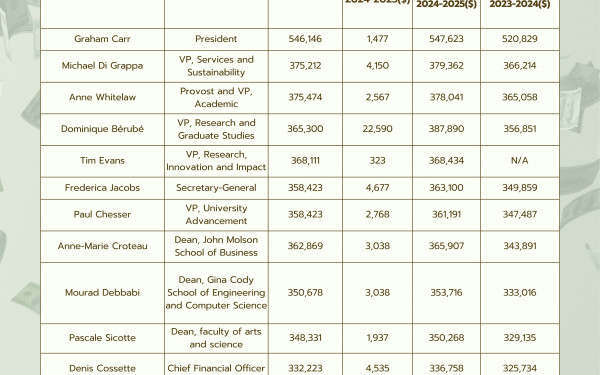Fiscal Cuts, Scholarly Bruises
TAs Feel “Pressure to Drop Assignments,” Told to Forgo Feedback
Concordia has compensated for eliminating the lowest pay grade for teaching assistants by paying them for fewer hours of work, resulting in less feedback being provided to students, said one philosophy student and a member of the union representing TAs.
“There’s a pressure to basically drop assignments,” Bob Sonin, a philosophy student and VP Mobilization of Teaching and Research Assistants at Concordia, told The Link. He went on to give the example of one of two TAs cut from a philosophy course, resulting in one less assignment in the syllabus.
Sonin also said it is “fairly common” for TAs to be told to not give comments on papers. “As a student, you need feedback to know what you’re doing right, what you’re doing wrong. And so if you don’t get the feedback, you don’t get as good an experience,” he said.
Writing essays is a university standard, but for philosophy undergraduate Leh Deuling and many of her classmates, essays and critical feedback are scarce.
“I have no way of knowing that I understand the material if I don’t have a chance to analyze the ideas on a piece of paper,” she wrote in a letter sent to The Link, adding that she had written only three papers in her entire first year in university.
The lack of assignments is due to several factors, according to Sonin. Previously, teaching assistants were paid in three different grades according to their positions. This year, the lowest pay grade was eliminated, making TAs more expensive for the university, he explained.
“What this means if you don’t increase the payroll significantly is fewer hours, which translates into fewer jobs,” Sonin said.
Because most classwork in 200- and 300-level classes is corrected by TAs, when positions are cut, fewer papers and exams can be corrected.
Often TAs will be responsible for the same workload as before, but paid for fewer hours. Sonin said that most TAs are reluctant to refuse to put in the extra hours needed to complete the job, regardless of whether they are paid or not.
Sonin explained that as the number of students registering for university has increased, the funding available for them has flatlined. While educational funding not rising in proportion to enrolment would eventually lead to insufficient resources, such as staff hired to mark papers, cutting the budget expedites the process.
“I think we’ve been seeing cuts because [funding isn’t] keeping up with the number of students coming in,” Sonin said. “If you don’t increase faculty proportionally to graduates, you run into trouble.”
Students Begin To Make a Move
Last Thursday, a group of students met at Sustainable Concordia to discuss possible actions to express their dissatisfaction with the effects of austerity measures imposed by the provincial government.
The conversation soon turned to the university’s Voluntary Departure Program, a program introduced by Concordia President Alan Shepard last month that allows full-time employees to leave their positions with a severance package. The university plans to let go of 180 employees with the program, 20 to 35 of which will be “critical positions” that Concordia will re-hire, Shepard said at the press conference announcing the cuts.
“I’ve never liked the idea of buyouts because very often the people that you lose are key people, people who have been around a long time, […] with job security and benefits and all that, and they get replaced with somebody who’s on a contract for six months,” Sonin said, adding that buyouts are a way of “de-unionizing” the university.
Michael Finck, Sustainable Concordia’s external coordinator, called it the “neo-liberalization of the university” at the meeting.
Valerie Simon, a philosophy student attending the meeting, said that although the administration claimed the cuts wouldn’t affect the university’s academic sector, they already have.
“Last year in the philosophy department, for example, we went from 60 classes to 45, to cut costs,” she said.
When asked whether Simon’s statement was accurate, the philosophy department directed the question to Concordia spokesperson Chris Mota.
“Classes are cut on a regular basis. That’s part of business,” Mota said, adding that she couldn’t confirm the philosophy student’s claim.
Though the meeting was advertised publicly, Concordia Student Union president Benjamin Prunty suggested The Link, the only media outlet present, be asked to leave.
“How does everybody feel about the media being here? […] We’ll have very little control over the narrative of whatever this group would be, versus whether or not a press release would be
released afterwards,” he said.
The philosophy department will vote on a position to take on austerity at their general assembly next Friday.
Meanwhile, Concordia’s Sociology and Anthropology Student Union will be voting on a motion to take a position “against the austerity measures imposed by the federal and provincial governments.”
The motion goes on to encourage SASU students and the larger student body to participate in a protest set for Halloween called “Austerity: a Horror Story.” It also “asks the concerned
Anthropology and Sociology faculty to make all class material optional for that date and not penalize absence in any way.”
Five student associations at the Université de Montréal have already voted in favour of holding a one-day strike on Oct. 31 so students can attend the protest, according to UdeM student newspaper Le Quartier Libre.







